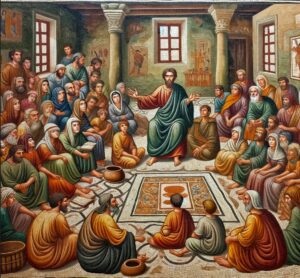Lesson Five First Century Church Summary

In the last half of the first century, the Christian Church underwent significant developments, marked by both growth and challenges: It experienced remarkable growth through the Jewish diaspora and the Roman empire. The teachings of Jesus Christ spread rapidly, primarily through the efforts of his disciples and early missionaries, in the eastern Mediterranean, including Jerusalem, Antioch, Ephesus, Corinth, and Rome.
Its spread often triggered opposition from Jewish, pagans, and Roman authorities. Christians faced persecution for their refusal to participate in pagan, empire rituals due to their allegiance to Jesus as the Messiah. The persecution intensified under Emperor Nero, who scapegoated Christians for the Great Fire of Rome in AD 64. Subsequent emperors, such as Domitian and Trajan, also issued edicts against Christians, leading to sporadic waves of persecution throughout the empire.
In the first century, the Christian Church lacked a standardized canon of Scripture, relying on oral tradition, letters from the apostles, and various written accounts of Jesus’ life and teachings. The absence of official doctrine was fertile ground for well-meaning disciples and outright fakes. Centuries later, some of the books were accepted as authoritative while others were disputed or considered apocryphal. The process of canonization took centuries and the pace of acceptance varied among different Christian communities.
The absence of official doctrine was fertile ground in the first century led to various theological controversies and heresies within the Christian Church. Among the most notable was the Judaizing controversy, which concerned the extent to which Gentile converts should adhere to Jewish customs and laws. Additionally, there were disputes over the nature of Jesus’ divinity and humanity, leading to conflicts such as the Gnostic heresies. Early church leaders, including the apostles and their successors, played a crucial role in combating heresy and establishing orthodox doctrine.
Overall, the last half of the first century was a formative period for the Christian Church, characterized by both growth and challenges. Despite persecution and theological disputes, Christianity continued to spread throughout the Roman
